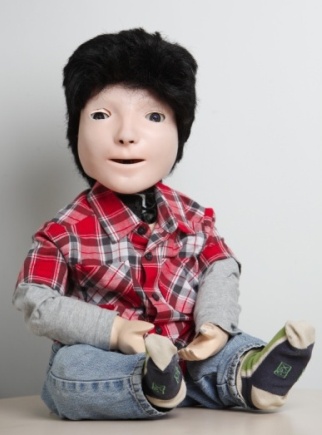Mar 12 2015
KASPAR, the University of Hertfordshire’s social robot, has been recognised as one of the most important university science research projects in the UK and is being showcased at a high profile science fair in London today.
 KASPAR
KASPAR
KASPAR, who is the size of a small child, is a minimally-expressive humanoid robot designed as a therapeutic toy for children with autism. It has been designed by the University of Hertfordshire's Adaptive Systems Research Group (ASRG), a leading international robotics research team. The team, led by Professor Kerstin Dautenhahn, have been developing and researching robots for use as therapeutic 'toys' for children at the middle- to lower-end of the autistic spectrum who have little ability to interact or communicate with the outside world.
Children with autism sometimes find social interaction and communication, even with parents and siblings, unpredictable and frightening. KASPAR has been purposefully designed as a minimally-expressive robot offering a more predictable and initially repetitive form of communication, which aims to make the social interaction simpler, non-judgmental and more comfortable for the child.
Having interacted and communicated with the robot, the children are often able to interact and communicate with other people through the robot, with KASPAR functioning as a social mediator. In turn, this may help them interact and communicate directly with other adults and children.
The event, Research 2.0 - Can UK science and innovation flourish in the next decade?, is hosted by the University Alliance and brings together business and university leaders, Parliamentarians and researchers to look at how science research can tackle the big questions facing the UK.
Professor Dautenhahn said:
“I am delighted that KASPAR was chosen as an exhibit at the University Alliance science and innovation showcase. The team at the University of Hertfordshire has been working on the KASPAR project since 2005 and our research has shown that robots can help children with autism interact and communicate more easily with people. This is important because there is mounting evidence that early intervention for children with autism may change the child's development trajectory.”
The event will also launch a new report from University Alliance which concludes that collaboration and connectivity are essential for the UK to continue to lead the world in excellent research and innovation.